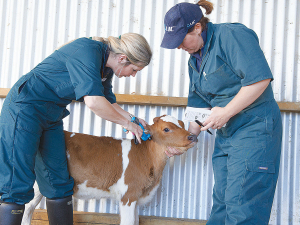LIC lifts half-year revenue on strong demand for dairy genetics
Herd improvement company LIC has posted a 5.2% lift in half-year revenue, thanks to increasing demand for genetics.
 For the sake of convenience and efficiency, tissue sampling calves for the BVD test can be combined with tagging or disbudding.
For the sake of convenience and efficiency, tissue sampling calves for the BVD test can be combined with tagging or disbudding.
This calving season, LIC is offering a BVD test for newborn calves to provide farmers with an early indication on the health status of their valuable replacement stock.
Previously, farmers who were testing their calves for BVD through LIC were required to wait until calves were at least 35-days-old befor being able to confirm the BVD status of the newborns.
BVD is a common, highly infectious disease that reduces milk production and causes health and fertility problems. Estimates put the annual losses for dairy farmers at around $127 million a year.
The disease is spread by carriers, also known as persistently infected (PI) animals, who are born with the virus in their body.
Malcolm Ellis, LIC general manager New Zealand markets, says eliminating the the 35 day delay before being able to test a calf for BVD will significantly improve a farmer's ability to manage the disease as well as add a layer of convenience on-farm as a result of conducting the test at such a young age.
"PI animals can cause havoc on the health status of the wider herd. Knowing the BVD status of your calves as early as possible will significantly reduce the risk of them passing the virus on to the rest of the herd."
Ellis highlights an additional benefit of the new test is the ability to couple it with other tasks happening on-farm at the same time.
"For the sake of convenience and efficiency, tissue sampling calves for the BVD test can be combined with tagging ot disbudding."
The new BVD test for calves was successfully piloted last year with the product offered to a limited number of customers.
Ellis says the co-op is committed to using its capabilities to develop new products and services that drive long term customer value on-farm.
"Value for our farmer shareholders is at the heart of what we do. Our diagnostics product suit supports armers to produce the most sustainable and efficient animals."
Dairy Women's Network (DWN) has announced that Taranaki dairy farmer Nicola Bryant will join its Trust Board as an Associate Trustee.
Rural Women New Zealand (RWNZ) says it welcomes the release of a new report into pay equity.
Red meat exports to key quota markets enjoyed $1.4 billion in tariff savings in the 2024-25 financial year.
Remediation NZ (RNZ) has been fined more than $71,000 for discharging offensive odours described by neighbours as smelling like ‘faecal and pig effluent’ from its compositing site near Uruti in North Taranaki.
Two kiwifruit orchards in the Bay of Plenty and one in Northland are this year's finalists for the Ahuwhenua Trophy competition.
The Government's chief science advisor, Dr John Roche says the key objective for the science sector in the coming year is bedding down the reforms which sees the merger of the previous entities.
OPINION: Staying with politics, with less than nine months to go before the general elections, there’s confusion in the Labour…
OPINION: Winston Peters' tirade against the free trade deal stitched with India may not be all political posturing by the…